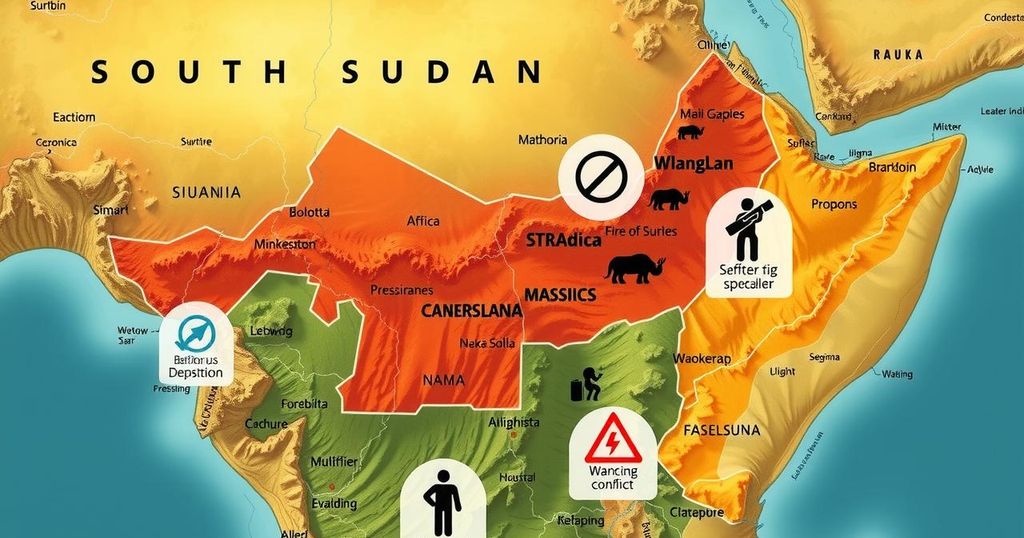South Sudan Faces Renewed Risks of Civil War Amid Political Unrest
The peace deal in South Sudan faces collapse after the arrest of Riek Machar, raising fears of renewed civil war. The government led by Salva Kiir and Machar is experiencing significant tensions, with violence between ethnic groups escalating. International bodies are urging de-escalation and negotiation to avoid further humanitarian disasters in one of the world’s poorest nations.
South Sudan, recognized as the youngest nation, faces the potential resurgence of civil war following the precarious situation surrounding its peace deal. After seceding from Sudan in 2011 amid prolonged unrest, South Sudan has endured significant internal conflict, including a civil war that erupted in 2013 and continued until a fragile ceasefire was established in 2018. This volatile history underscores the ongoing threats to stability in the region.
The current crisis is rooted in disputes involving the coalition government led by President Salva Kiir and his rival, Riek Machar, leader of the SPLM/A-IO party. Recent events, including Machar’s arrest, have prompted the SPLM/A-IO to declare that this action could spell the end of the existing peace agreement. They contend that the prospects for peace are severely compromised, placing the country in a precarious position.
Machar’s arrest comes amid a backdrop of political turmoil, including the dismissal of other SPLM/A-IO officials and the intervention of Ugandan troops invited by Kiir. The SPLM/A-IO has characterized this military involvement as aggression against South Sudanese civilians, further escalating tensions. Machar had also previously denounced Uganda’s actions in a formal letter to the United Nations.
Elections have yet to be held in South Sudan, with the existing government stemming from a 2018 power-sharing agreement intended to stave off further conflict. Ethnic divisions, predominately between the Dinka tribe of Kiir and the Nuer tribe of Machar, exacerbate the instability. Recent clashes in areas such as Nasir have resulted in multiple fatalities, heightening concerns of imminent conflict.
Government officials, including Minister Michael Makuei, have accused Machar of inciting rebellion and threatening the peace process. These accusations have caused the SPLM/A-IO to remain reticent, leaving doubts about their response to the diplomatic pressures following Machar’s detention.
International reaction has been swift, with UN representatives expressing alarm at the deterioration of the peace agreement and urging de-escalation. Several Western nations have also called upon President Kiir to reverse Machar’s arrest and to establish a ceasefire. In a precautionary move, the U.S. embassy has advised its citizens to evacuate South Sudan amidst rising tensions.
Additionally, the African Union has committed to sending a delegation to South Sudan to help mitigate the crisis, while regional leaders from Kenya have initiated dialogue aimed at achieving peace. Despite these efforts, significant challenges lie ahead for the nation, underscored by economic distress and humanitarian needs exacerbated by ongoing violence and mismanagement.
Given the dire humanitarian situation, where over two-thirds of the population lives in extreme poverty, the potential return to instability poses serious risks not only for South Sudan but also for the wider region. The World Bank’s recent analyses emphasize the urgent need for comprehensive strategies to address both the humanitarian crisis and the underlying political conflicts, stressing that South Sudan remains a nation on the precipice of collapse.
In summary, South Sudan continues to teeter on the brink of civil war as internal divisions, a precarious power-sharing agreement, and external military interventions complicate the fragile peace. The arrest of prominent political figures such as Riek Machar threatens to unravel the hard-won stability of the nation, prompting urgent calls for international mediation. As the humanitarian crisis deepens and economic challenges persist, proactive measures must be taken to avert further descent into violence and crisis.
Original Source: www.wral.com




Post Comment